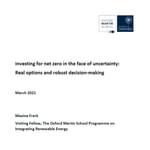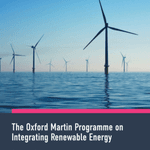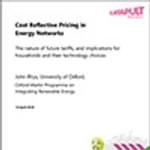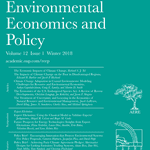The Oxford Martin Programme on
Integrating Renewable Energy

The Oxford Martin Programme on Integrating Renewable Energy ran from 2015 - 2022. The following page is an archived resource. The programme has since transitioned to the Zero Institute where the ambitious goals of integrating renewable energy continues.

The Challenge
Mitigating climate change is a major challenge for the 21st Century and requires a transition to low carbon energy systems.
Energy supply is responsible for 65% of greenhouse gas emissions, so transition to a low carbon energy system is critical to mitigating climate change. Intermittent renewable energy sources will play a key role and integrating them effectively into electricity systems is therefore a critical challenge.
Retaining a secure electricity system, rather than resource availability or generation cost, is increasingly seen to be the major, long-term constraint to the adoption of high shares of intermittent renewables. Supply and demand need to be balanced and there are potential imbalances on time scales from seconds to seasons, as well as other technical issues for system and grid operation.
Technical approaches to accommodating intermittency in power systems are excess generation capacity, demand flexibility, energy storage and grid inter-connection. However, the best way to deploy these in combination is not agreed.
Moreover, electricity markets currently provide insufficient incentives for capacity, flexibility and innovation; and the scale at which action is required ranges from the individual household to international agreements.
A fundamental re-think of regulatory, market and institutional arrangements is required. Any changes will need to ensure continuing high levels of electricity system security on which modern societies depend.
This programme aims to deliver a framework for understanding technical, market and policy requirements for integrating renewables across a wide range of scales, resource types and contexts.
We will develop the conceptual tools needed to understand the role and combination of different approaches in different scenarios, how these might be adopted in electricity markets and how such innovation might be stimulated and governed. We will investigate how this is beginning to play out and what further change is needed at a number of scales, ranging from new mini-grids to continental systems.
The programme brings together an interdisciplinary team of eight experts on energy issues, from five Oxford University departments. It has practical support from key industrial and government organisations and with that support aims to deliver early results relevant to technical, commercial and policy problems.
Our ambition with this four year programme is to provide frameworks for both governments and industries to integrate renewable energy sources into the mainstream, in order to help them achieve targets on carbon emissions.

Oxford Martin Initiative on Reconfiguring Energy Needs
In the wake of the COVID-19 pandemic, Professors Nick Eyre and Malcolm McCulloch launched a new related initiative to shift society’s approach to energy and accelerate net-zero living.
The Oxford Martin Initiative on Reconfiguring Energy Needs will work with partners and large datasets to identify tipping points in energy use that have been exposed by the pandemic. These findings will be used to develop virtuous feedback cycles and messaging to drive lower energy demand from households, to drive down energy use, energy bills and shift society towards equitable and sustainable living.
Electric Vehicles and the Future
A new micro-documentary from Oxford Sparks features Dr Sivapriya Mothilal Bhagavathy and Dr Katherine Collett discussing their work on making electric vehicles a central part of our transport and energy futures.
Watch videolatest news
View allPolicy action from world leaders can accelerate a Just energy transition
The 2022 Intergovernmental Panel on Climate Change (IPCC) report insists that we have options in all sectors to at least halve emissions by 2030, but the aim to limit global warming to less than 1.5 degrees is not going to happen unless radical steps are taken.
Global smart grid partnership launched
The International Community for Local Smart Grids will take the lessons each participant is learning locally and share these globally.
Costing an Electric Vehicle Future - Ignore the Alarmists
The All Party Parliamentary Group opposing government policy on electric vehicles claim in a new report that the required investment in electricity generation will “bankrupt UK plc”. Unfortunately for this claim, it is based on some major errors of fact and understanding.
Solving the ‘chicken and egg’ problem of Electric Vehicles in Africa
Electric vehicles could have a transformative effect on health, carbon emissions and consumer costs in Sub Saharan Africa, but governments must solve the problem of investment in infrastructure and vehicles.

Shining A Light On Energy’s Zero Carbon Future
Long Read
The Integrating Renewable Energy team includes economists, social scientists, materials scientists and engineers. Find out how their research is making an impact on the ground, helping to create new systems approaches that can deliver cleaner and cheaper energy.
Read
videos
How we created a roadmap for integrating renewable energy
Prof Nick Eyre and Dr Steve Smith in conversation: "Zero carbon energy systems"
"Powering the future: switching on the renewables" with Prof Malcolm McCulloch
Professor Cameron Hepburn on Stranded Assets Risks
"The cost of energy review" with Prof Dieter Helm
"Disruptive oil and electricity futures" with Amory Lovins
publications
View all
Data needed to decarbonize paratransit in Sub-Saharan Africa

Investing for net zero in the face of uncertainty: Real options and robust decision-making

The Oxford Martin Programme on Integrating Renewable Energy - Synthesis Report

Cost Reflective Pricing in Energy Networks

Solar photovoltaic self-consumption in the UK residential sector: New estimates from a smart grid demonstration project

Policy Brief—Encouraging Innovation that Protects Environmental Systems: Five Policy Proposals
